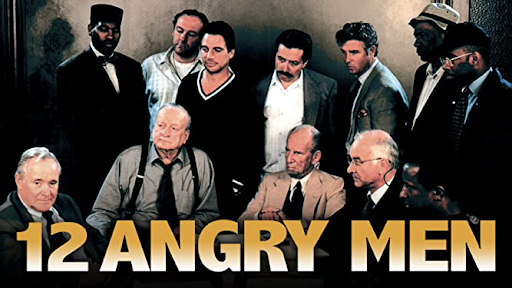Photo Credit ( Pixabay )
The dusty light created lengthy shadows on the crumpled green bed cover on a cold January afternoon. I found myself engrossed in the drama as two men clashed for the destiny of an eighteen-year-old lad. As they went over minor facts from the first trial, I couldn’t help but wonder if the court’s decisions were accurate. Do juries frequently choose the most obvious explanation?
The 1957 Sidney Lumet courtroom drama 12 Angry Men is the movie that inspired these thoughts. The jury’s decision on whether or not an 18-year-old killed his father is at the center of the narrative.
Black and white movies used to appear boring to me because they lacked color. That changed when I became interested in the unique style of old-fashioned criminal dramas. I was drawn to 12 Angry Men because of its status as an enduring classic. Acclaim and recommendations just made me more curious.
The movie takes place in a small jury room, but its themes are universal and just as relevant now as they were in the late 1950s. The film highlights the flaws in the legal system and the prejudices of the juries, demonstrating how a juror’s decision can be influenced by their personal prejudice or state of mind. It casts doubt on the idea of pure truth by demonstrating how prejudice and carelessness may affect it.
Juror #8 casts doubt on the boy’s culpability, despite the initial impression that it is beyond question. He refuses to declare the youngster guilty in the absence of proof because he thinks the case merits more investigation. His tenacity sparks heated discussions, especially with Juror #3 who obstinately holds onto false views. This scenario perfectly captures the frustration of knowing someone is incorrect but finding it difficult to persuade others of it.
Justice and discrimination are two topics covered in 12 Angry Men that are still relevant today. The prejudice of Juror #10, who found the youngster to have a “bad background,” illustrates how prejudices can corrupt the legal system.
Juror #5, who at first seems like a simple caricature with messy hair and big glasses, turns out to be an important character. His persona develops throughout time, exhibiting nuance and providing key insights that change perspectives and inject levity into the severe circumstances.
The medium and long shots throughout the film add to the suspense and sensation of distance, which is further enhanced by the cinematography. The strategically placed close-ups highlight pivotal events and add to the film’s objective analysis of the case.
I give the movie 12 Angry Men a 3.5-star rating. Its examination of prejudice and classism makes it a timeless film that is appropriate for all ages. It makes us consider the nature of truth and the ways in which our perceptions affect it. Because of its insightful analysis of justice and human nature, this movie is a must-see.nd examination of justice and human nature.


Leave a Reply